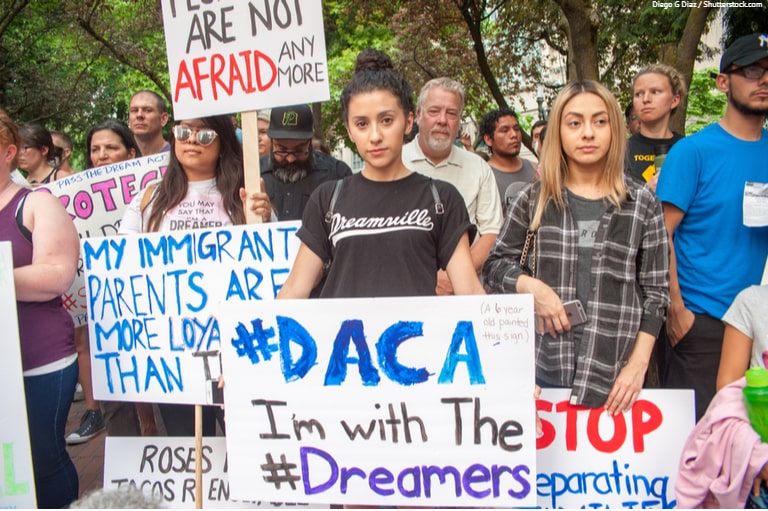By Richard Wright, Chair of Public Affairs, Department of Geography at Dartmouth College
Because COVID-19 is a new virus, everyone is vulnerable. We know we’re physically and economically at risk, we don’t know for how long, the threat is everywhere, we can’t see the threat, and contracting the virus could kill us.
If these circumstances (what we might call temporary unprotected status) are strange and unsettling to many, they are all too familiar to people in the US’s Temporary Protective Status (TPS) program, as well as others in immigration limbo.
We have few protections from this novel coronavirus. Only a few national governments rapidly implemented effective strategies to contain the spread of the pathogen and even in those places the virus has killed hundreds and remains a significant threat. Other, slower-to-react governments, such as in the US, have left millions exposed with alarming, and rising, death tolls.
On the front lines, health-care providers, retailers, grocery store workers, truckers, garbage collectors, and other essential workers have found themselves exposed because they lack adequate personal protective equipment (PPE). On the streets, people must socially distance and isolate to stave off the threat of contracting COVID-19. Economies have been shuttered and shattered, threatening the basic livelihoods of millions of people.
These vulnerabilities will end, sooner or later. Face masks, like toilet paper, will become easier to obtain, PPE will no longer be in short supply. We’ll develop different and better therapies. A vaccine will be produced and/or people will gain herd immunity. Economies will eventually get back on track.
But we don’t know when. So, in the meantime, most of us remain in some fundamental way vulnerable to contracting COVID-19. A temporary status of uncertainty and vulnerability is akin to that of hundreds of thousands of immigrants, such as those in TPS and DACA, and, now with the President’s latest impulsive action on immigration, those who have found themselves in green card application limbo.
People can acquire TPS status when conditions in their home country temporarily prevent them from returning safely or where the country is unable to handle the return of its nationals adequately. The Secretary of Homeland Security (DHS) may designate a people from a particular country for TPS because of extraordinary and temporary conditions there such as armed conflict, environmental disaster, or an epidemic.
Over the years, the program has provided sanctuary for many people but notably some 300,000 Salvadorans who fled the 1979-1992 civil war. Ironically, US support of a vicious dictatorship stoked much of the violence in El Salvador triggering a mass and ongoing exodus.
Much like the US’s Deferred Action on Childhood Arrivals (DACA) program designed to provide temporary relief from deportation for those people brought to the country when they were children, TPS is a form of deferred deportation. TPS and DACA beneficiaries are “documented”: they are not subject to detention or deportation and may work, thus paying taxes and contributing to Social Security and Medicare. TPS and DACA are temporary and provide no path toward permanent residency. Many TPS and DACA recipients have been in this status for decades while their asylum or other claims for permanency are slowly adjudicated or await the Supreme Court to rule on the 800,000 DACA recipients.
TPS leaves people in a precarious, indeterminate state. Hanging over every recipient is the chance of dashed plans, lost livelihood, terminated legal status, and for those whose asylum claims are denied, a return to a place where they may be killed.
The emergence of the SARS-CoV-2 virus has made most of us temporarily unprotected, and in a limbo that has some of the characteristics of TPS and DACA.
TPS came into existence as part of the Immigration and Nationality Act of 1990, signed into law by President George H. W. Bush. In accepting the Republican Party’s nomination to be their Presidential candidate in 1988 Bush called for a “kinder gentler nation”. Thirty-two years later, the US has become more divided and a less kind, less gentle place.
The pandemic though has suddenly presented us with a choice. We can change direction; become kinder and gentler. History offers different lessons. The Black Death in 14th century Europe that reduced the population by between 30 and 40 percent resulted in widespread pogroms as Jews were held responsible. Other disasters have produced alternative outcomes.
After WW2, for example, US society changed for the better: inequality declined, new social safety nets materialized, civil rights gradually became law. Perhaps such changes will recur, along with a new belief in science that will permanently sideline anti-vaxxers and climate change deniers and renewed confidence in the value of a free press.
Our immigrant workforce provides essential labor through the COVID-19 crisis and the foreign born disproportionately work in health-care sectors. With a deeper understanding of just what immigration limbo entails, we can come up with a better plan for TPS and DACA recipients: permanence and security. Being temporarily (un)protected is no way to live a life.
Richard Wright is the Orvil E. Dryfoos Chair of Public Affairs at the Department of Geography at Dartmouth College.
Note: The views expressed in this article are the author’s, and not the position of Intellectual Dose, or iDose (its online publication). This article is republished from OpenDemocracy under a Creative Commons license.



